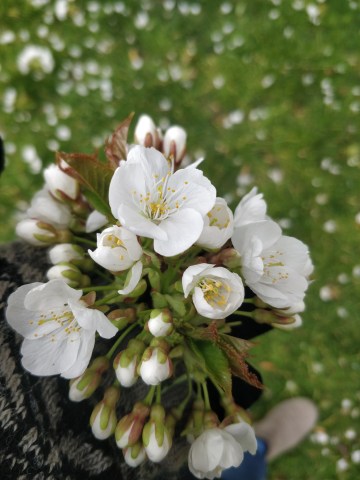Recovering

In December of 2017, I walked into a door. This was not my intention.
This was a few days before Christmas, and though I’ve had more spectacular black eyes, the lump on my head took a week or so to go down.
I was also struggling to use words after 5 p.m., falling back on sitting mutely at the kitchen table and occassionally making grunting noises. Short-term memory was having a bit of a pisser, and everything seemed extremely hard. “You can do this,” I would mutter under my breath, going to buy a pint of milk. “You can do this.”
At work, no one really noticed. “You look a little pale,” was about as much as there was to the matter. I wasn’t working very well – everything which should have been easy was, in fact, incredibly hard. But the habits instilled from years and years of labour meant things seemed fine, on the surface. Doing author events, people remarked on how energetic I was. Only my editor perhaps perceived that “energetic” was only a few breaths away from “manic”, followed by a teetering collapse. Coming home from a long day, I’d burst into tears for no apparent reason, without actually feeling sad, until my partner fed me and talked me into going to bed, where I’d start awake at 2 a.m. unable to sleep, not knowing why.
To cut a long story short – last year I went through a period of exhaustion that just knocked me sideways.
It was a long time coming. I have had 7 weeks holiday in 9 years, and at least 2 of those 7 weeks are debateable. Earlier in the year, I remember wondering if I should get make-up for my eyes, since they looked so damn bruised, and started taking Vitamin-C pills, because that’d fix things. It took something akin to a panic attack at 3 a.m. for me to really admit that perhaps we were beyond the powers of concealer and fresh veg.
It’s now February, and it’s taken an intensive amount of doing very little to both be able to write easily, and to be able to write about this. For a start, admitting that I was exhausted comes with a big psychological badge of shame. For as long as I can remember, the only way to be truly awesome in all things is to work longer, harder and better. Taking breaks makes you weak, vulnerable, and any free time you have should be filled with self-improvement and, ideally, seeking more work. Even those day which were officially flagged as “do nothing” were filled with tax forms, household maintenance, emergency pants washes and catching up on email. “Do nothing” was in effect a phrase for “do all the low level stuff that has to be done but doesn’t feel burningly frightening until it is”.
To admit that it was all a bit much, was to admit failure. This is of course bullshit, but the psychological urge to be awesome all the time and never let anything slip ever, is very deeply built into my make-up. It’s also, incidentally, built into the make-up of basically all my friends, of whom a significant majority are ridiculously hard-working women. To be acceptably ok, we have to go further than anyone else would. I don’t know whether that reflects the educational pressures we were raised with – for a lot of my mates, to get less than As at everything was, our schools told us, to die young and alone. Maybe it reflects the economic pressures of our generation – we graduated into a recession and have been stuck with stagnant wages for years, the dream of home ownership a fantasy even as rents rise with daily costs. Or maybe it’s just a manifestation of the old harsh lessons of the old harsh studies which show that when a man and a woman are put forward for the same job with precisely the same CV, the man gets interviewed and the woman does not.
Maybe the truth, as always, is nuanced and complicated and lies somewhere in between.
Either way: to succeed is everything, and to take a few minutes out to recognise that I had needs beyond working, exercise and sleep was, of course, to fail. It took my mind and body essentially deciding to shut down to force a hasty re-evaluation of this state.
By luck, I had an appointment just as the shit was hitting the fan, with my local GP. Or rather with the nurse, since the surgery isn’t big on letting the doctors out for much less than scarlet fever or bubonic plague. She had a half-hour slot booked for an asthma review, which took about 4 minutes, since being asthmatic your entire life gives you a certain zingy briskness about these things. At the end of it, and not even sure if it was worth wasting her time, I explained the situation.
“So basically,” I concluded, “I’ve burnt out. Anything I should do?”
“I see. Do you think you’re depressed?”
“Pretty sure I’m not.”
“Hum… tricky. I burnt out once, exactly like what you describe. The surgery where I was working told me to take a month off. I remember going to the BHS in Watford on my first day off an just sitting and having a cup of coffee and looking at the car park, and it was… well, it was… yes.”
Now, as medical advice goes, the BHS in Watford wasn’t quite what I expected, but the actual gist was pretty damn on the money. STOP. And maybe don’t just stop, but stop, and go for a walk, and look around you at a world turned to walls and rain, instead of streets and sky, and be ok with that. Be ok with just having that cuppa in Watford, be ok with not being at work, be ok with just being still, and quiet, and don’t freak out about that email you haven’t sent or that thing you haven’t done or the endless march of endless things that’s currently driving you mad. In fact, in her own quaint way, the nurse had essentially distilled 2000 years of Buddhist doctrine into a coffee cup. Sit. Be still. Open your eyes. Be ok.
Stopping couldn’t really happen until Christmas Day, owing to numerous commitments. The majority of these commitments were fun and awesome things; it was just hard to remember that, so deep the exhaustion ran. However, on the 25th at 5.30 p.m., I turned the channel from Bergen-Oslo by train in real time (the family’s festive favourite) to the Dr Who Christmas Special and announced to all assembled: “This is now what we are watching and afterwards I shall sleep.”
And afterwards, I slept.
And for a while, it was hard. Not just the sleeping bit – my body is in such habits of anxiety that it’s taken the best part of 8 weeks to overcome the need to be wide awake at 2 a.m. freaking out over life – but all the rest. Stopping. Being ok with stopping. Being ok with just going for a long walk. Having a cuppa somewhere random ‘cos why not? Scheduling those bits of my job that can’t really be put off, in a way which is kind. Not “everything must be finished now!” but “everything can be finished before the deadline and actually, that deadline is far enough away that, if you say not to other things, you’ll make with time to spare.” Saying no to other things is hard. Saying no, when you’re a freelancer, is always hard.
Because somewhere in the mess of all of this, there’s a re-definition going on. Who I am, what I do, and what I value needs to fundamentally shift if I’m gonna get to 80 and be a terrible Grand Dame of Literature who makes outrageous remarks while wearing magenta coal scuttles on my head. (This is the dream.) My sense of self is inherently tied up in my sense of being an awesome professional, but that identity lacks a certain mercy. Now I’m trying to shift it. To value the time I have for myself, and find more time to be there for others without trying to make myself responsible for things beyond my control. Finding ways of saying no, without becoming selfish, lazy or cruel. Finding things to say yes to, without that commitment becoming a burden.
I took January off, and only really resumed work in February, slower, more careful. This is a privilege that I am extraordinarily grateful for – both for the people who saw that I needed to stop, but for the savings and the space that meant I could do so without constant, knawing fear. Time is the single greatest gift that money buys, and costs more than food or electricity. Self-help books which tell you to find “me-time” tend not to come with a winning lottery ticket at the back to really empower that process.
But it wasn’t until a few days ago that I found myself sat by the river, walking home from rehearsals, just watching the winter light, the city and the people. And there it was – that thing that I’d forgotten the feeling of for so long. Life, brilliance, the bustle and noise of the city I love – just that is a magical spell that sets my world spinning. Children on half term, carefully walking on tip-toe to avoid the cracks in the pavement. The smell of doughnuts from the van opposite ITV, and the squeal of excitement as hungry tourists first whif its offerings. Good busking of old hits, bad busking of personal poems. The rhythm of building works on the water, the gossip of people who’d never walked this stretch of riverside before, the way peer groups tend to buy the same brand of trainer, the rocking of the boats as the Clipper went by, red balloons above Somerset House, the spires of Middle Temple and the Royal Courts of Justice, old folks still in love and young couples still learning to snog. I’d missed it, for so long that I couldn’t even name the thing I missed. Life, living, and that being wonderful.
Now it’s February. I’m still lighting gigs, and have a show opening in March. I’m still writing books, and will always be writing books, I suspect. And I’m still working on being ok with pacing my days, with tea and long walks as well as hard labours, dragging my hours down from 60 to 40 to maybe even 30 a week, and if I can get away with living that way, that would be a delight. Writing this, I can feel that echo of shame, that feeling that I should be doing better. But nah. I had a couple of months of intense exhaustion, but also had the space, opportunity, friends and support, to allow me to catch it and find a way to change. That transforms this from being a tale of woe to something excellent and good, and I’m extraordinarily grateful for that, and more and more find myself going to sleep and waking up with a smile on my face, excited by the day.





